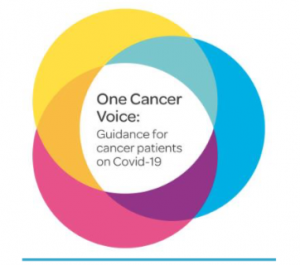 One Cancer Voice guidance for cancer patients on Covid-19: updated 4 June
One Cancer Voice guidance for cancer patients on Covid-19: updated 4 June
The Government is advising everybody to:
- Stay alert
- Stay at home as much as possible
- Work from home if you can
- Limit contact with other people
- Keep your distance if you go out (2 metres apart where possible)
- Wash your hands regularly
Do not leave home if you or anyone in household has symptoms of Coronavirus.
In the first instance, please refer to wider Government guidance on:
- Staying at home if you think you have coronavirus (self-isolating)
- Staying alert and safe (social distancing)
- Staying alert: what you can and cannot do
- Staying safe outside your home
- How to protect clinically extremely vulnerable people (shielding)
The Government also have a wide range of information to help people at this time, including on employment, financial support, school closures and childcare. See: https://www.gov.uk/coronavirus
Summary of key lines for patients
Cancer services during the restoration and recovery from COVID-19
The NHS is currently moving into the next phase of its response to the COVID-19 outbreak: to restore and recover all services for patients. If you need to access care or treatment for suspected or diagnosed cancer, arrangements have been put in place to keep you safe from COVID-19.
If you have a worrying symptom, and you think it might be cancer, please contact your GP surgery straightaway. GP surgeries are offering online consultations and/or remote triage so that people do not have to attend in person unnecessarily.
If you have been asked to go to hospital for further investigation or for treatment if you are diagnosed with cancer, it is important that you attend. The NHS is reorganising the way that it delivers services to keep you safe:
- COVID protected hubs have been established for cancer surgery across the country to keep patients safe. These are in COVID protected areas of a hospital or on separate hospital sites. The model is now being expanded to cover diagnostics too.
- Wider measures are also being taken by all hospitals treating COVID patients to ensure that COVID and non-COVID patients are kept separate. This may include using separate entrances for COVID and non-COVID patients, ensuring staff and patients do not move between different parts of the hospital, and making sure that, as far as possible, staff are social distancing both inside and outside clinical areas.
- The staff caring for cancer patients will be vigilant for any symptoms that they or their families are showing and are required to self-isolate in line with government guidance. Staff will be tested for the virus if they are displaying symptoms. Hospitals are also introducing testing for staff not displaying symptoms where there is testing capacity to do so.
- All patients can support NHS staff to maintain COVID-protected environments by being aware of any symptoms they or their family may be displaying, and by following the advice of the clinical teams working with them. If a patient is uncertain whether they should come into the hospital, they should discuss this with their clinical team.
The NHS is here for you if you need it: help us to help you.
Read the One Cancer Voice guidance document for cancer patients on COVID-19.
The following charities have helped developed this guidance:
Anthony Nolan, Bloodwise, Bowel Cancer UK, Brain Tumour Research, brainstrust, Breast Cancer Now, Cancer 52, Cancer Research UK, Jo’s Cervical Cancer Trust, Leukaemia Care, Lymphoma Action, Macmillan Cancer Support, Myeloma UK, Ovarian Cancer Action, Pancreatic Cancer UK, Prostate Cancer UK, Roy Castle Lung Cancer Foundation, Sarcoma UK and Teenage Cancer Trust.
This advice will be updated as and when more information becomes available. It was last updated on 9 June.









